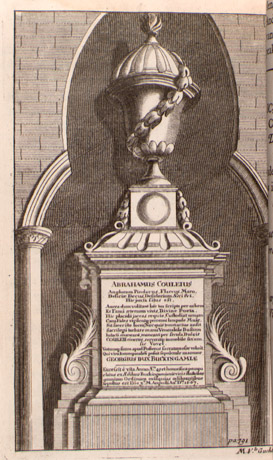The Abraham Cowley Text and Image Archive
Cowley's Westminster Epitaph, with a Parody
From The Works of Abraham Cowley, 10th ed. (London, 1707). Reproduced with permission from the Special Collections of the University of Virginia. |
|
† Whilst thou above wear'st a triumphant wreath And we the Poets militant beneath Anthems to thy immortal honor breath [Fill] the dark chest which for Apollo's heir Ecclesia Anglicana doth prepare And let the vestal nunne's watch ever here. Let Libitina's selfe think't no disgrace To be the Angel Guardian of this place That no rude hand this monument deface. Here let seraphic Cowley rest his head Here let him rest it in this earthy bed Till we all rise with glory lawrelled. Whilst through ye world thy golden verses passe more golden than those of Pythagoras And whilst [sweet lyri]st thy anointed name is registred in the large rowle of Fame Here rest secure and let this minster be a Sanctuary in that sense to thee, Let the nine muses bid farewell to sleep ever to watch the grave thy corps doth keep. New consecrated is the holy ground no crime no guilt must here be found; Let not the man of vices hither come and with his breath profane this sacred tomb. Let Cowley's dust lie quiet in its urne till the last trump all things to ashes turn; Let it its station keep and quiet lie till the blest dawn of immortality. |
Here lies, reduc'd to ashes and cinder, Not St Paul, but St Abraham Pindar. It is not fierce Horatio Vere, but Horatio Cowley buried here. Nor is this Polydore Virgil's room, but Cantabrigian Virgil's tomb. The pleasant'st child e're England bred The bravest youth e're Cambridge fed The dearest man e're wore a head. Whilst that thy ballads up and down do flutter and the town gallants of thy town muse mutter Possesse this church, though thou couldst not ye Savoy and in her soft lap let Melpomene have thee. Let no Court storm nor tough-lung'd zealot blow thy neatly angled atomes to and fro And sleep in beggar's Limbo, by dull Chaucer, under the whim wham urn as broad as sawcer Whilst yt thy name doth smell as sweet as May's and all ye table talk is of thy Thais [Bays?] thy miscellany and thy Davideis. Rot away here and let the vault endure thee let the religion of the house secure thee and let the watching muses here immure thee. Avaunt all ye that look profane and vile Stand off, stand off, a hundred thousand mile Nor with your thumbs this monument defile. Let sugar-candy Cowley sleep in's grotte let not ye people wake him, let them not nor steal away the surgeons gally pot. Whilst on wing'd Pegasus thou [Phoebus Son] through air and earth and sea and all do ride Whilst by Orinda's pipe thy praise is blown And thou in fairy land art deified; Whilst thou dost soar aloft leave coyrs behind to be interrd in antient monast'ry And to the chimeing rabble safely joyn'd [To] Draiton, Spencer and old Jeoffery. |
"The Living Author's Epitaph" // Elegies on the Death // 1689 Paraphrase of the Westminster Epitaph // Other Verses on Cowley // Back to Cowley's Works (1707)